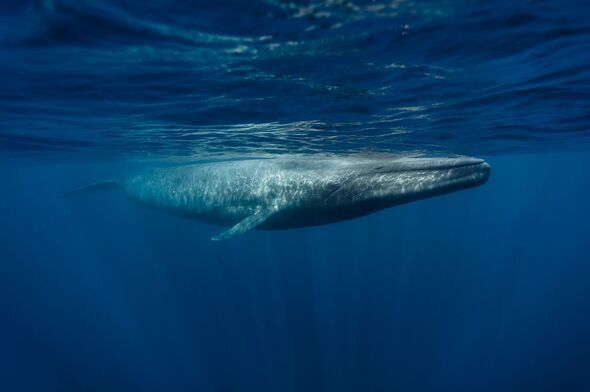

Blue whales, the largest animals on Earth, have suddenly gone silent, a development that has scientists and experts worried about the future of the animal, and the ocean. A recent study published by PLOS analyzed six years worth of acoustic data collected from the ocean's floor and found a sharp decrease in blue whale singing. The authors of the study credited the decline to the animal's food source disappearing over time.
Researchers began collecting data for this study in 2015, when a marine heatwave called "The Blob" caused a large percentage of krill- small, shrimp-like crustaceans that blue, humpback and fin whales largely depend on as a food source- to disappear. As a result, the sudden absence of krill in the ocean circulation, coupled with the spreading of a toxic algae bloom between 2015 and 2016 in the northeastern Pacific, caused blue whale singing to also decrease. Since then, blue whale songs have declined by approximately 40 percent.
"When you really break it down, it's like trying to sing while you're starving," John Ryan, a biological oceanographer at the Monterey Bay Aquarium Research Institute told National Geographic. "They were spending all their time trying to find food."
Interestingly, humpback whales, which have more varied diets, continued to sing through the disruption, while blue and fin whales stayed silent as they hunted the ocean for food.
"We don't hear them singing," said Ryan, referring to underwater sound recordings they captured during their study. "They're spending all their energy searching. There's just not enough time left over- and that tells us those years are incredibly stressful."
Scientists warn that climate change, driven by humans burning fossil fuels, might make this trend worse over the years. Since the beginning of the study, researchers have also identified marine heat waves in 2018 and 2019 during the summer months, crucial months for whales as they stock up on krill to prepare for the rest of the year.
"There are whole ecosystems consequences of these marine heat waves," Kelly Benoit-Bird, a Monterey Bay Aquarium marine biologist and co-author of the study, told National Geographic. "If they can't find food, and they can traverse the entire West Coast of North America, that is a really large-scale consequence."
The change in food source is also one of the reasons for a recent steep decline in Pacific gray whales, a June report found. A new count suggests that there are about 13,000 gray whales, the lowest number since the 1970s. By comparison, in 2019, there were about 20,500 gray whales.
Further, from 2019 to 2023, the species suffered from an Unusual Mortality Event that scientists say stemmed from localized ecosystem changes in Subarctic and Arctic feeding grounds, USA Today reported.
"The science is clear- climate change is transforming the oceans," Dawn Barlow, a Marine Ecologist at Oregon State University told Earth.org. "We see it from the smallest plankton to the largest predators. Listening to these ecosystems is essential if we hope to protect them."